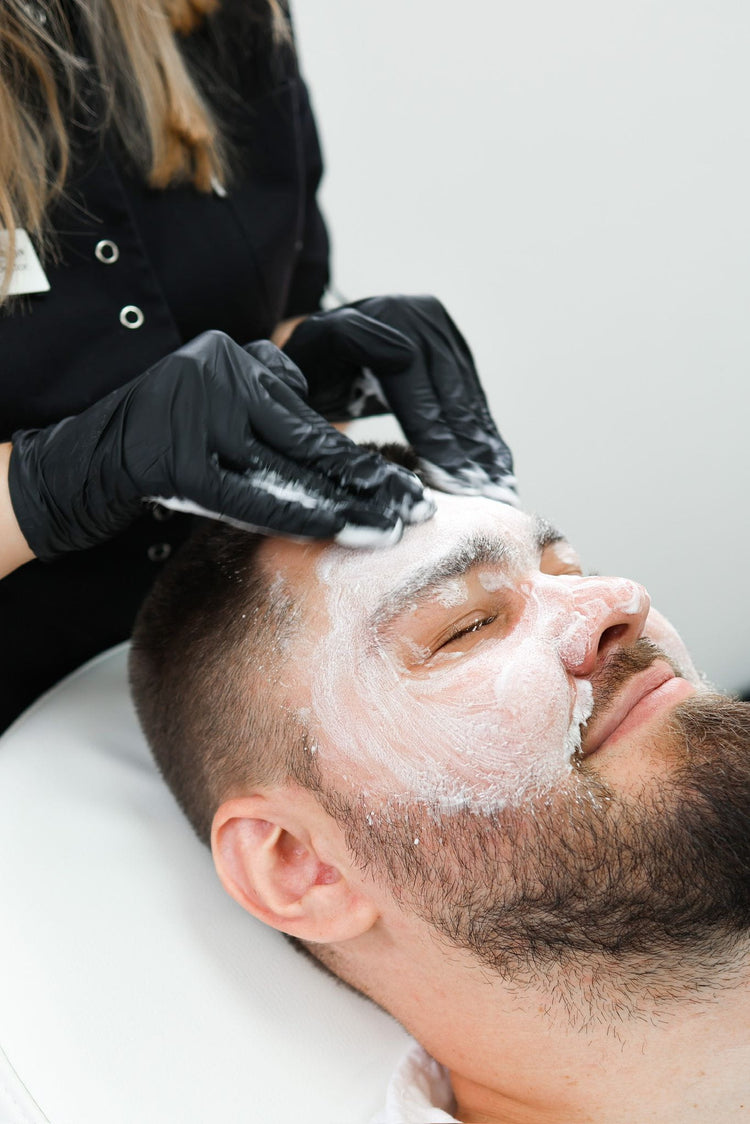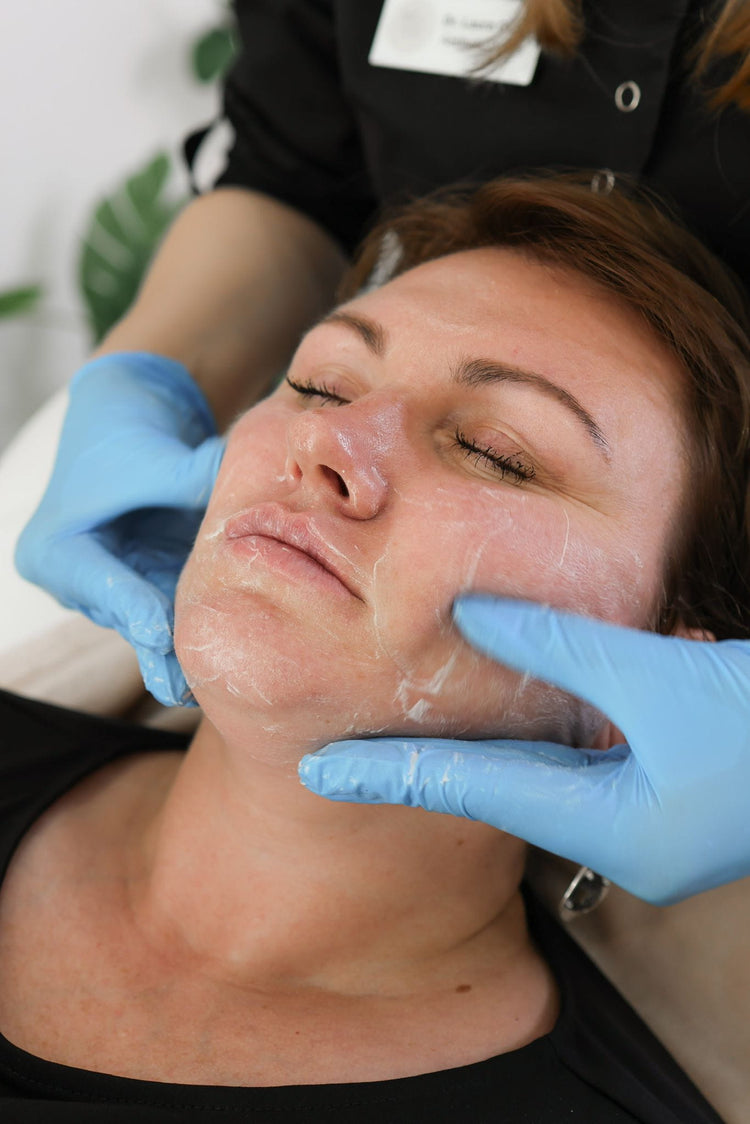About Your Skin Concerns
Understanding your skin concerns and knowing how to communicate them effectively is crucial for getting the most out of a skincare consultation.
What are your specific skin concerns?
Before your appointment, take some time to reflect on your specific skin concerns. Are you struggling with acne, dryness, sensitivity, wrinkles, or hyperpigmentation? Be as detailed as possible, noting the location, severity, and any patterns you’ve observed. For example, instead of simply saying “acne,” describe if it’s blackheads, whiteheads, or inflamed pimples, where they appear on your face, and how often they occur.
How long have you been experiencing these concerns?
To help your dermatologist understand your skin issues, be prepared to share the duration of your concerns. When did you first notice these particular problems? Have they been persistent for months or years?
Have you tried any treatments for these concerns before?
Another important question to ask is about previous treatments.
- Have you tried any treatments for these concerns before?
- If so, what were they and how did they work for you (or not work)?
This information helps your dermatologist assess the effectiveness of past approaches and determine if there are any underlying factors contributing to your skin issues.
Your Skincare Routine
Knowing what to ask during a skincare consultation can make all the difference in getting the best treatment for your needs.
What is your current skincare routine like?
My skincare routine focuses on simplicity and effectiveness. I cleanse my face twice daily with a gentle cleanser, followed by a vitamin C serum in the morning and a retinol serum at night. I moisturize every day, and use sunscreen with an SPF of 30 or higher whenever I’m outside.
What products are you currently using?
My skincare routine focuses on simplicity and effectiveness. I cleanse my face twice daily with a gentle cleanser, followed by a vitamin C serum in the morning and a retinol serum at night. I moisturize every day, and use sunscreen with an SPF of 30 or higher whenever I’m outside.
Are you noticing any positive or negative reactions to your current products?
Since incorporating these products into my routine, I’ve noticed a significant improvement in my skin’s texture and clarity. My complexion appears brighter, and fine lines seem less prominent.

I haven’t experienced any adverse reactions to the products so far.
Medical History & Lifestyle
Medical history and lifestyle factors play a crucial role in determining suitable skincare treatments.
Do you have any allergies or sensitivities?
Be prepared to discuss any allergies or sensitivities you have, including those related to skincare products.
This information is essential as some ingredients can cause reactions like irritation, redness, or breakouts.
Are you taking any medications, supplements, or hormones?
Are you taking any medications, supplements, or hormones?
This question helps your dermatologist understand potential interactions between your medications and skincare products. Some medications can affect skin health or sensitivity.
Do you have any medical conditions that might affect your skin?
Do you have any medical conditions that might affect your skin?
Medical conditions such as eczema, psoriasis, or thyroid disorders can influence skin health and require specialized care.
What is your typical diet and lifestyle like?
What is your typical diet and lifestyle like?
My typical diet includes plenty of fruits, vegetables, whole grains, and lean protein sources. I stay hydrated by drinking plenty of water throughout the day.
In terms of lifestyle, I prioritize regular exercise, which helps improve circulation and promote overall well-being.
I also manage stress through activities like yoga or meditation.
Desired Outcome & Preferences
When embarking on a journey to improve your skin health, understanding your desired outcome and preferences is paramount. This involves clearly identifying your skin concerns, their severity, duration, and any relevant history of treatments.
What are your skincare goals?
Desired outcomes for skincare vary from person to person. Some common goals include reducing acne, minimizing wrinkles, improving skin tone and texture, managing dryness or sensitivity, and achieving a more youthful appearance.
It’s important to be specific about what you want to achieve. For example, instead of simply saying “I want clear skin,” specify if you’re looking to reduce blackheads, minimize redness, or prevent new breakouts.
Consider your preferences regarding treatment methods. Are you open to chemical peels, microdermabrasion, laser treatments, or prefer a more gentle approach with topical products and lifestyle changes?
Are there any specific treatments you’re interested in?
Are there any specific treatments you’re interested in?
For example, are you curious about facials, chemical peels, microneedling, or laser therapy?
What are your preferences for treatment frequency and intensity?
What are your preferences for treatment frequency and intensity?
Clearly stating your comfort level with the frequency and intensity of treatments is crucial. Do you prefer weekly sessions or a more spaced-out approach?
Are you comfortable with procedures that might cause temporary redness or discomfort, or do you prefer milder treatments?
Do you have any budget limitations?
Do you have any budget limitations for treatments?
Questions to Ask About the Treatment
Asking the right questions during a skincare consultation can empower you to make informed decisions about your treatment plan.
What type of treatment is recommended for my concerns?
What type of treatment is recommended for my concerns?
How many sessions will I need?
How many sessions will I need? Understanding the number of sessions required for your desired outcome is essential for planning and budgeting.
What can I expect during and after the treatment?
Inquire about the specifics of the recommended treatment, such as the procedures involved, any potential risks or side effects, and the expected duration of each session.
Ask about the recovery process after treatment. Will there be any downtime? What can you expect in terms of skin appearance and sensations during the healing period?
Find out how long it will take to see results and if ongoing maintenance treatments are necessary to sustain the desired outcome.
Are there any potential side effects or risks associated with the treatment?
Are there any potential side effects or risks associated with the treatment?
What products should I use at home to complement the treatment?

To ensure the best possible outcome, it’s important to understand how your home skincare routine can complement your professional treatments. Ask your dermatologist about specific products they recommend for your skin type and concerns.
For example, if you have acne-prone skin, they might suggest using a cleanser with salicylic acid or benzoyl peroxide. If your concern is hyperpigmentation, they may recommend products with vitamin C or niacinamide.
Learn more about chemical peels for smoother skin at It’s Me & You Clinic with Dr. Laura Geige
- What Is The Best Non-Surgical Facelift In 2024? - November 7, 2025
- What Are The Best CBD Gummies For Everyday Wellness - November 6, 2025
- Understanding The Different Types Of THC-Infused Drinks - November 4, 2025
